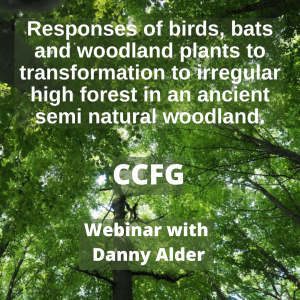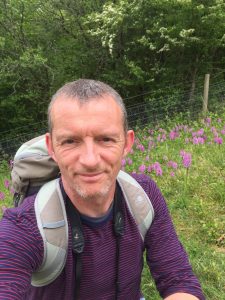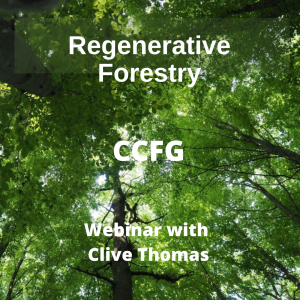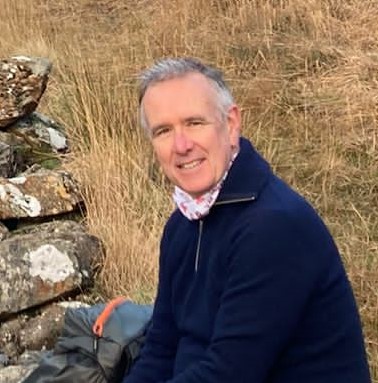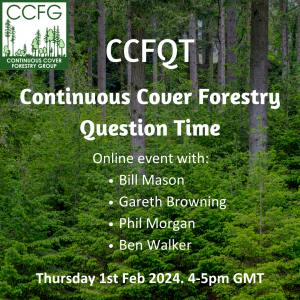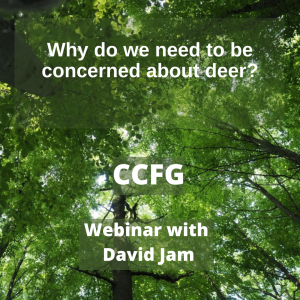 CCFG will be hosting their next webinar – Why do we need to be concerned about deer? – with David Jam – on Thursday 20th November at 4pm GMT.
CCFG will be hosting their next webinar – Why do we need to be concerned about deer? – with David Jam – on Thursday 20th November at 4pm GMT.
Summary of presentation:
-
-
-
-
-
-
-
-
-
-
- Why we are where we are
- What is the current situation with wild deer in the UK?
- How big is the risk
- What are their impacts?
- Some case studies
-
-
-
-
-
-
-
-
-
David has over 35 years’ experience within forestry and deer 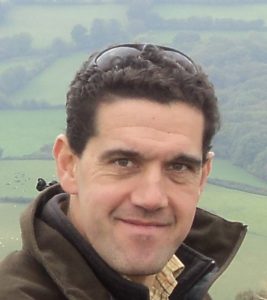 management, at a practitioner, operational and strategic level within the public and private sector.
management, at a practitioner, operational and strategic level within the public and private sector.
He is based in Herefordshire but has a national remit.
His experience has included:
- Forestry Contractor
- Forest manager (Harvesting and Establishment)
- Wildlife manager and National Wildlife Lead
- Deer Officer and Director Deer Initiative Ltd
- National Deer Policy Advisor Forest Services/Forestry Commission
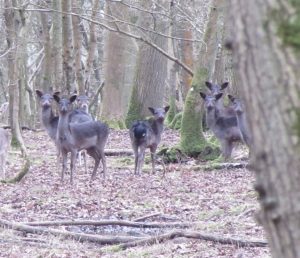
His current remit includes:
- Embedding deer into current and future policy, guidance and incentives to support increased levels of deer control
- Provision of advice to DEFRA and other government departments.
- Increasing Sector skills and capacity
- Developing the evidence base
- Improving the venison supply chain
- Development of the England Deer Strategy/Action plan as part of governments Environmental Improvement Plan.
- Commissioning evidence gathering and research.
- Leading the FC Deer Officer team, setting regional and national priorities related to protecting woodland creation and the management of existing woodlands.
- Representing Forestry Commission on national stakeholder groups
- A director of Deer Management Qualifications Ltd (DMQ)
To book your place please visit this link.
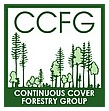

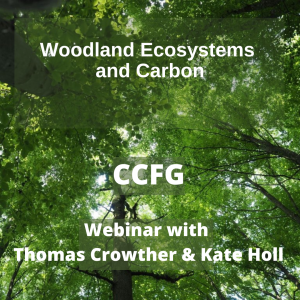 CCFG will be hosting their next webinar – Woodland Ecosystems and Carbon – with Tom Crowther and Kate Holl – on Thursday 16th October at 4pm BST.
CCFG will be hosting their next webinar – Woodland Ecosystems and Carbon – with Tom Crowther and Kate Holl – on Thursday 16th October at 4pm BST. 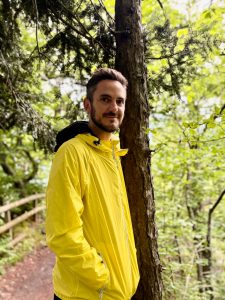
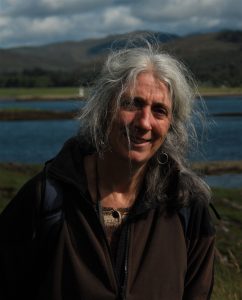 Kate Holl has been a woodland advisor with NatureScot and its predecessors for almost 40 years, specialising in assessing woodland habitat condition, particularly the evaluation of herbivore impacts in natural woodland. She is a joint author of the Woodland Herbivore Impact Assessment method, and in 2017 under a Churchill Fellowship, travelled widely within the North Eastern Atlantic bioregion to learn about the flora of woodlands less impacted by herbivores.
Kate Holl has been a woodland advisor with NatureScot and its predecessors for almost 40 years, specialising in assessing woodland habitat condition, particularly the evaluation of herbivore impacts in natural woodland. She is a joint author of the Woodland Herbivore Impact Assessment method, and in 2017 under a Churchill Fellowship, travelled widely within the North Eastern Atlantic bioregion to learn about the flora of woodlands less impacted by herbivores. CCFG will be hosting their next webinar – Biomass – Fuel – Silviculture: The role of CCF in fire prevention- with Alex Held – on Thursday 23rd January 2025 4-5.30pm.
CCFG will be hosting their next webinar – Biomass – Fuel – Silviculture: The role of CCF in fire prevention- with Alex Held – on Thursday 23rd January 2025 4-5.30pm.  Freiburg University, Germany. He started as a fire ecologist at the Fire Ecology working group of the Max-Planck Society, got a number of operational qualifications in the US and South Africa. He moved from fire ecology to fire management and worked with the Global Fire Monitoring Center GFMC in Europe and Southern Africa. Later, Alex worked with the South African Working on Fire Program, from its early beginnings till 2012, when he joined EFI.
Freiburg University, Germany. He started as a fire ecologist at the Fire Ecology working group of the Max-Planck Society, got a number of operational qualifications in the US and South Africa. He moved from fire ecology to fire management and worked with the Global Fire Monitoring Center GFMC in Europe and Southern Africa. Later, Alex worked with the South African Working on Fire Program, from its early beginnings till 2012, when he joined EFI. north of Scotland on private estates for Cawdor Forestry Ltd. She has been fortunate to have worked in forests where she has been able to practice CCF, almost exclusively with Scots pine using group selection systems or strip felling. Hazel has learnt that CCF requires a lot of patience and that you don’t always get it right first time! She’s also starting to underplant larch and initiate regeneration of Douglas fir.
north of Scotland on private estates for Cawdor Forestry Ltd. She has been fortunate to have worked in forests where she has been able to practice CCF, almost exclusively with Scots pine using group selection systems or strip felling. Hazel has learnt that CCF requires a lot of patience and that you don’t always get it right first time! She’s also starting to underplant larch and initiate regeneration of Douglas fir. years’ experience across a range of jobs and countries. He has managed silvicultural research in the UK and in Somalia, Lesotho, Vanuatu and Guyana covering natural forest through to plantations and temperate to tropical and across a range of different cultural environments. Currently Andrew is part of a team at Forest Research conducting silvicultural and wood properties research, with specific responsibility for CCF, short rotation forestry and species mixtures. For twenty four years he led the development and management of undergraduate and postgraduate degree courses in forestry, delivered through part-time, distance-learning and full-time teaching at the National School of Forestry.
years’ experience across a range of jobs and countries. He has managed silvicultural research in the UK and in Somalia, Lesotho, Vanuatu and Guyana covering natural forest through to plantations and temperate to tropical and across a range of different cultural environments. Currently Andrew is part of a team at Forest Research conducting silvicultural and wood properties research, with specific responsibility for CCF, short rotation forestry and species mixtures. For twenty four years he led the development and management of undergraduate and postgraduate degree courses in forestry, delivered through part-time, distance-learning and full-time teaching at the National School of Forestry. industry since the 1980’s and operated as an independent manager and consultant since 1997, he has considerable experience in a broad range of forestry related issues. David’s client base includes large estates, voluntary organisations, public sector and smaller privately owned woodlands, covering a range of forest and woodland types. David has particular expertise in timber harvesting and marketing. He is a director of SelectFor Ltd and Partner of D&H Pengelly Forestry & Agi-environment Consultants. David is responsible for several properties where owners’ objectives are met through the long-term application of Continuous Cover Forestry principles, resulting in the emergence of well-developed permanently irregular stand structures.
industry since the 1980’s and operated as an independent manager and consultant since 1997, he has considerable experience in a broad range of forestry related issues. David’s client base includes large estates, voluntary organisations, public sector and smaller privately owned woodlands, covering a range of forest and woodland types. David has particular expertise in timber harvesting and marketing. He is a director of SelectFor Ltd and Partner of D&H Pengelly Forestry & Agi-environment Consultants. David is responsible for several properties where owners’ objectives are met through the long-term application of Continuous Cover Forestry principles, resulting in the emergence of well-developed permanently irregular stand structures. Following the webinar on 23rd May with Victoria Stokes talking about an experiment in underplanting in conifers at Clocaenog Forest, a recording has now been made available on YouTube which
Following the webinar on 23rd May with Victoria Stokes talking about an experiment in underplanting in conifers at Clocaenog Forest, a recording has now been made available on YouTube which 
